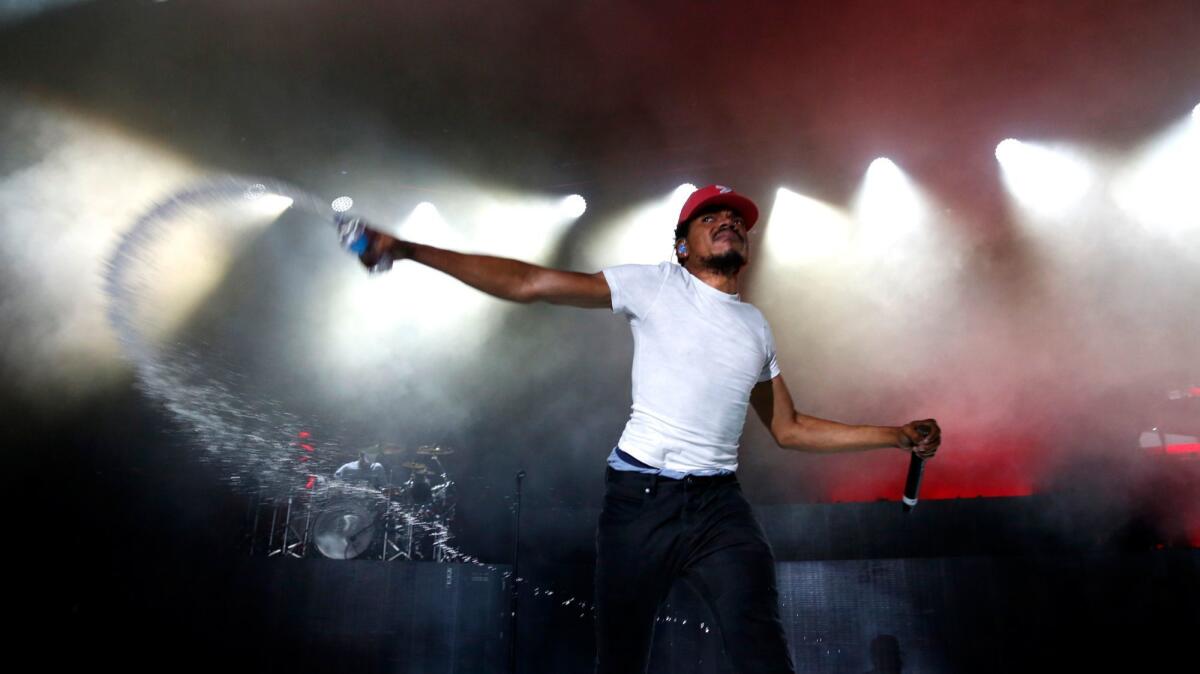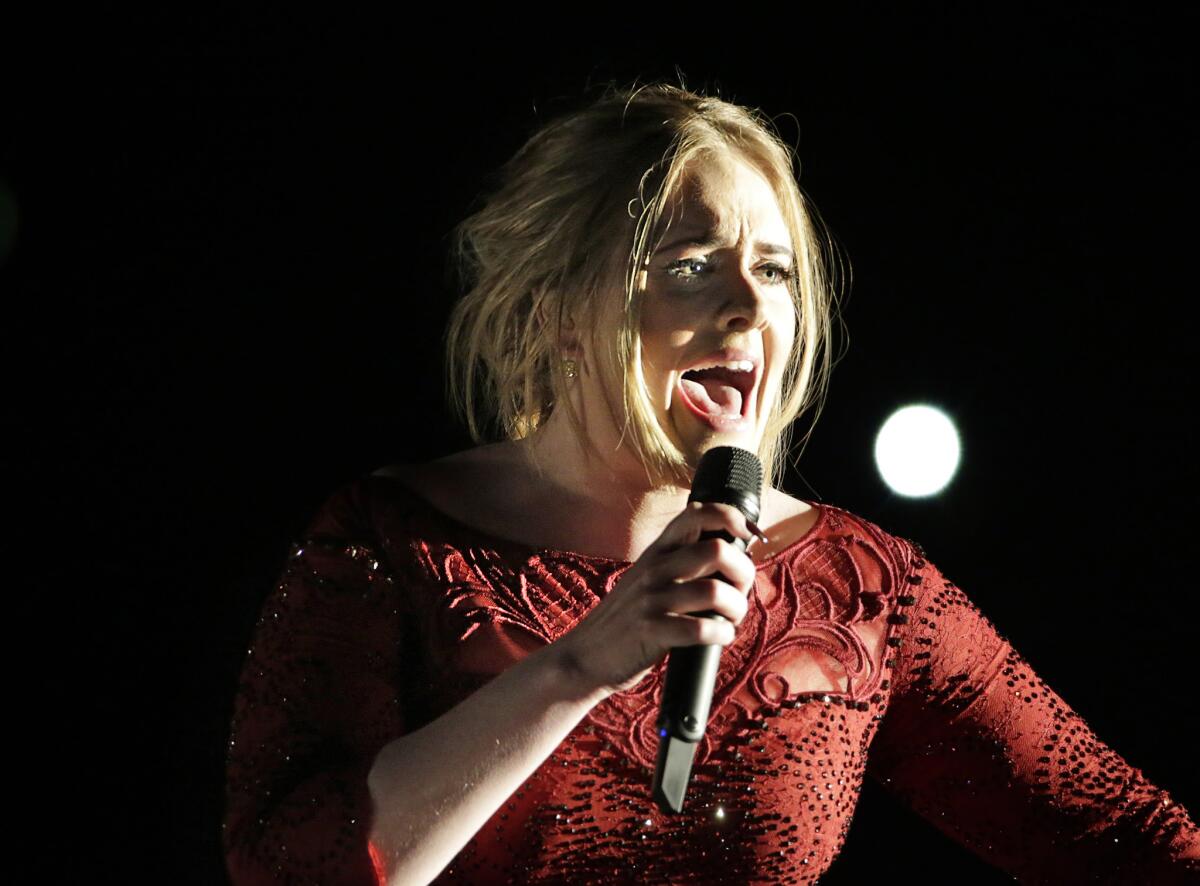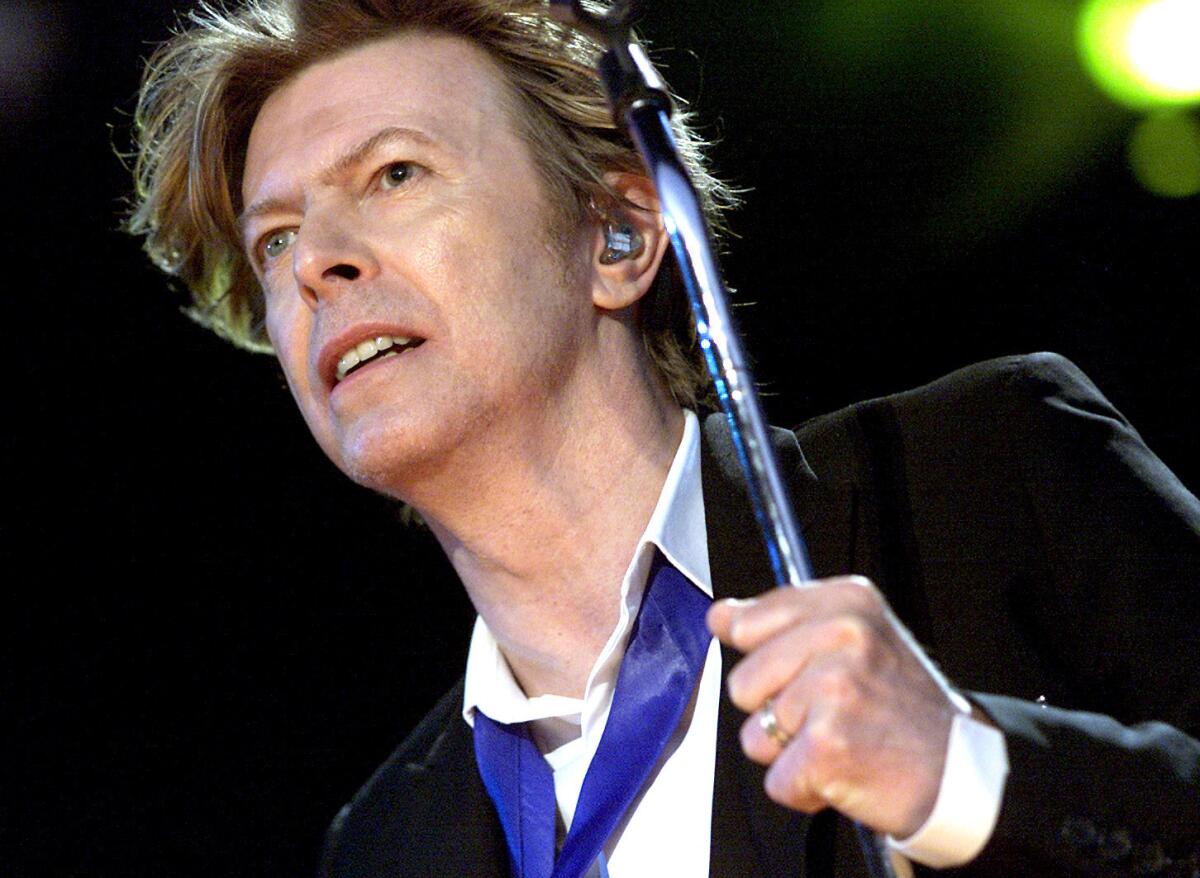Beyoncé tops Grammy nominations with nine, Chance the Rapper makes history with streaming-only nods
Lightning-rod pop-R&B superstar Beyoncé has scored a field-leading nine Grammy Award nominations for her provocative “Formation” single and “Lemonade” album, the Recording Academy announced Tuesday morning. R&B and hip-hop artists Kanye West, Drake and Rihanna are hot on her heels, with eight apiece. And Chance the Rapper is right behind them, with seven nominations his first year in the running.
At the same time, the year’s biggest blockbuster album, Adele’s “25,” yielded five nominations for the British singer-songwriter, with nods in all three of the general categories for which she’s eligible — album, record and song — recognizing her unequaled reach across age, gender and stylistic boundaries with the broad-based appeal of her traditionally rooted pop songs of romantic heartbreak and recovery.
Launching the 2017 awards season with the unveiling of hundreds of nominations over 84 award categories, the Recording Academy cast barely a glance into the rearview mirror of pop music.

We never want to be in position where music that deserves to be in the mix is usurped by some technicality in the process.
— Recording Academy President Neil Portnow
In years past, the album, record or song categories typically include what have been considered career-recognition nods to veteran stars such as Carlos Santana, Herbie Hancock, Steely Dan and Eric Clapton. This year’s slate puts the attention squarely on musicians who are actively shaping the sound of popular music on radio, YouTube, Spotify and social media platforms consumers use most to find new music.
A key example is the number of nominations generated by Chance the Rapper’s debut album, “Coloring Book,” which was issued in May only as a music stream rather than as a physical CD, old-school mix-tape or digital download.
His seven nominations, including best new artist, in part resulted from a rule change that opened the door for music not available in more traditional forms.
“We never want to be in position where music that deserves to be in the mix is usurped by some technicality in the process,” Recording Academy President Neil Portnow told The Times on Monday. “The evaluation and judgment of our voting members is always about the music and excellence, not at all about sales or marketing or technology.”
See full Grammy nominations coverage »
Yet the nominated recordings, spanning an eligibility period from Oct. 1, 2015, to Sept. 30, 2016, contain little content directly addressing the volatile year leading up to the election of Donald Trump as the 45th president, the Black Lives Matter movement or other social activities that grabbed headlines throughout the year.
The most socially or culturally provocative work acknowledged with top Grammy nominations is Beyonce’s “Formation” single, which touches on themes of identity for women and African Americans, especially African American females.
When she performed “Formation” during the halftime show at the Super Bowl in February, Beyonce ignited a firestorm of public debate over its appropriateness during the most-watched sports event of the year.

In the record-of-the-year category, which lauds songwriting, vocal performance and record production, the other nominees are Adele’s “Hello,” which describes an unsuccessful attempt at apology for breaking a lover’s heart; Danish group Lukas Graham’s “7 Years,” which recounts turning points in life; Rihanna featuring Drake’s “Work,” and Twenty One Pilots’ ode to millennials’ mounting sense of real-life pressures in “Stressed Out.”
Among the general category surprises are the album of the year nomination for Justin Bieber’s “Purpose” collection, signaling the growing maturity of his music, at the expense of Paul Simon’s widely acclaimed “Stranger to Stranger” late-career album that many had expected might land an overall album nomination.
Along with the Adele, Beyonce and Bieber works, the album category also includes Canadian rapper Drake’s hit collection “Views” and country-Americana singer-songwriter Sturgill Simpson’s “A Sailor’s Guide to Earth,” taking a slot that often recognizes a roots-music artist alongside bigger-selling pop and R&B works.
Song of the year contenders, officially focusing exclusively on music and lyrics, include “Formation,” “Hello,” “7 Years” and Bieber’s acerbic kiss-off to a former love, “Love Yourself,” plus Mike Posner’s “it’s lonely at the top” lament about the hollowness of fame, “I Took a Pill in Ibiza.”
With artists of color dominating so many categories, the nominations might be interpreted as a further response to the chastising of the entertainment industry on the subject of diversity, although it’s also a reflection of the hyper-collaborative nature of creating hip-hop, R&B and pop songs today.
Case in point: Should Simpson’s album win for album of the year, the Kentucky singer and songwriter would collect two Grammys for himself as the artist and producer, and four additional awards would go to its engineers and mixers.
For the Drake, Adele, Beyonce and Bieber albums, each would generate more than two dozen Grammys for the featured performers, producers and engineers involved.
Portnow doesn’t see any kind of special outreach needed in terms of the way the film industry was castigated in recent times through the social media #OscarsSoWhite response to major Academy Awards results.
“We typically don’t have that as an issue,” Portnow said. “We have always had a great advantage on the creative side of the community of being a melting pot.
“Music by definition is very inclusive, very diverse,” he said, “and those who make music tend to have greatly opened their minds to diversity — whether it’s gender or genre or generation or ethnicity.”

As for reflections of how the musical community is reacting to various topics that made the news in 2016, Portnow said, “I was talking to someone the other day about the influence of culture on society, and the influence of society and socioeconomic and political issues have on culture. I think you can debate ad nauseam which follows which, but clearly there’s a connection between the two.
“If you’re an artist or songwriter, it doesn’t necessarily mean you sit down behind your laptop and immediately bang out what your feelings are or make whatever musical statement you may have. It takes time.”
Artists vying for the overall new artist Grammy Award beyond Chance the Rapper are country singers Kelsea Ballerini and Maren Morris, Oxnard-reared musician-producer Anderson .Paak and New York City-based deejay-producer-songwriting duo The Chainsmokers.
Voters will also have the opportunity to decide who’s the better traditional pop vocalist: Barbra Streisand or Bob Dylan, competing with one another in the pop vocal album category along with Andrea Bocelli, Josh Groban and Willie Nelson.
Grammy nominating committees’ penchant for posthumous recognition for musicians who died recently has largely been held in check this year, despite the parade of high-profile deaths during the year.
David Bowie appears posthumously in four categories: alternative music album for “Blackstar,” which he recorded last year while dealing with terminal cancer; rock song and rock performance for the title track, and another for best engineered nonclassical album.
The latter category also includes the only nod to Prince, with a nomination for his “Hit N Run Phase Two” collection.
Nominations in the country fields hint at an end to the bro-country trend that’s dominated the field in recent years in the party-minded hits of Luke Bryan, Jason Aldean, Florida Georgia Line and Jake Owen.
The country solo performance category comprises four women—Brandy Clark, Miranda Lambert, Maren Morris and Carrie Underwood—and one veteran male country artists, Keith Urban.
The country album category also skews female with nods for Clark, Morris, and the latest ultra-traditional recording from veteran singer and songwriter Loretta Lynn up against albums by Simpson and Urban.
Awards will be announced during the annual Grammy Awards telecast from Staples Center in Los Angeles, scheduled for Feb. 12.
Nominees were chosen from 22,000 submissions and will be decided by some 13,000 voting members of the Recording Academy, a body made up of musicians, producers, songwriters, record executives, publishers and other industry members.
A complete list of nominees is available at the official Grammy website, www.grammy.com.
See the most-read stories in Entertainment this hour »
Follow @RandyLewis2 on Twitter.com
For Classic Rock coverage, join us on Facebook
ALSO
How did Beyoncé receive nine Grammy nominations but Adele only five?
The rise of best new artist nominee Anderson .Paak was a decade in the works
What’s the difference between record and song of the year?
Questlove is not impressed with the Grammy nominations
More to Read
The biggest entertainment stories
Get our big stories about Hollywood, film, television, music, arts, culture and more right in your inbox as soon as they publish.
You may occasionally receive promotional content from the Los Angeles Times.










